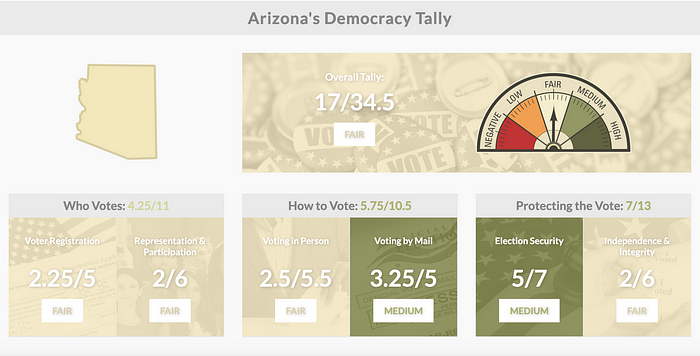Voting and Elections
2024 Election Policies Preview: Arizona

In advance of November’s election, MAP’s new “Election Policies Preview” series details voting and election policies in key states, including policies that impact who votes, policies that impact how to vote, and policies that protect the vote. This week, we are continuing the series with Arizona.
Quick Facts About Arizona
- Democracy Tally — 24th in the U.S. for voting and election policies
- 2020 Voter Registration Rate — 86.9%
- 2020 Presidential Election Voter Turnout Percentage — 65.9%
- 2020 Presidential Election Vote Margins — 10,457 votes (0.3%)
- 2020 Presidential Election Youth Voter Turnout — 51%
- 2022 Midterms Youth Voter Turnout — 24.8%

Arizona’s Voting and Election Policies:
Policies Impacting Who Votes
The Democracy Maps track policies related to voter eligibility and registration under the category of Who Votes. This category includes policies such as automatic and online voter registration, which work to determine the eligible electorate in each state. Who Votes also includes policies related to representation and participation, including rights restoration for formerly incarcerated people and the partisanship of state primary systems.
Voter Registration Deadlines
Arizona is one of 22 states that sets registration deadlines more than 16 days prior to Election Day. Arizona’s registration deadline is 29 days prior to Election Day, just one day short of the maximum 30 days set by federal law.
In other words, Arizona does not allow voters to register in the month leading up to Election Day, despite evidence that allowing Election Day registration in particular increases access for voters and boosts turnout. This policy is even more consequential since Arizona is one of 26 states that does not utilize automatic voter registration.
Voting Rights for Formerly Incarcerated People
Arizona is one of 10 states with the strictest form of laws regulating voting rights for formerly incarcerated people. The state requires additional action following the completion of sentence before rights are restored.
Specifically, Arizona requires individuals with multiple felony convictions to undergo a two-year waiting period following the completion of their sentence. After that, they must apply to a court in order to have their rights restored. According to the Sentencing Project, more than 230,000 Arizonans are currently disenfranchised due to felony convictions, including more than one in ten Black adults.
Policies Impacting How to Vote
The Democracy Maps track policies related to in-person and mail voting methods under the category of How to Vote. This category includes policies like early voting, voter ID requirements, and the availability of absentee or mail voting.
Voter ID Laws
Arizona is one of four states with a strict non-photo ID requirement, the second most restrictive categorization in our policy tracking.
This means that voters in Arizona without an acceptable form of ID are forced to cast a provisional ballot. From there, they must appear in person at the registrar’s office within 5 days after the election to present an acceptable ID or their ballot will not be counted. These unnecessarily strict requirements have been shown to disproportionately impact voters of color, as well as transgender voters.
Access to Ballot Boxes
Arizona is one of 30 states where drop boxes are required or allowed to be used statewide, and are broadly accessible. Drop boxes are a popular option with voters in Arizona, with over 90% of residents choosing to cast their ballots by mail in 2020.
Despite their popularity, drop boxes have been controversial in Arizona. There have been multiple attempts through legislation and litigation to ban the use of secure drop boxes in the state since 2020. Conservative groups have also announced plans to monitor drop box locations throughout the state this November, raising renewed concerns after incidents of voter intimidation in 2022 when armed individuals were present at drop box locations in multiple counties.
Policies Protecting the Vote
The Democracy Maps track policies related to the independence, integrity and security of elections under the Protecting the Vote category. This category includes policies related to security like post-election audits, and policies such as laws allowing state legislatures to interfere in election administration that harm the independence and integrity of elections.
Post-Election Audits
Arizona is one of 41 states that require the use of a post-election audit. Properly conducted, nonpartisan audits provide public confidence in election results and can also act as a safeguard against hacking and foreign interference.
In 2021, partisan officials hired unqualified individuals to conduct improper ballot reviews in Arizona in order to undermine trust in state voting systems and election officials. These efforts, which compromised the integrity of both ballots and voting machines, should not be characterized as audits, as they were designed and undertaken for illegitimate purposes.
Bans on Guns in Polling Places
Arizona is one of 17 states that has a total ban on the possession of firearms in polling places, including both concealed and open carry weapons.
The 2020 election cycle saw an alarming increase in reports of intimidation against voters and election officials. Guns at polling places, even if not used to commit violence, can be used to intimidate voters and election officials. Combined with the marked rise in threats to election officials and violent rhetoric around elections, the proliferation of firearms in our country represents an increasing danger for everyone participating in the voting process.

Arizona saw the closest margin of any state in the 2020 election, with President Biden winning by just over 10,000 votes. Arizona has also become a hotbed of election denialism, with multiple legal challenges filed in 2020 seeking to overturn the legitimate results of the election. In addition, partisan officials in the state also conducted improper “audits” following the election, where unqualified individuals were hired to conduct reviews of ballots in an effort to undermine trust in the election results. Since 2020, the state has also seen numerous attempts by election deniers to delay certification and implement hand counting of ballots. With election denialism remaining a potent force in the state, it is safe to expect controversy in Arizona, and it will certainly be a state to watch this November.
